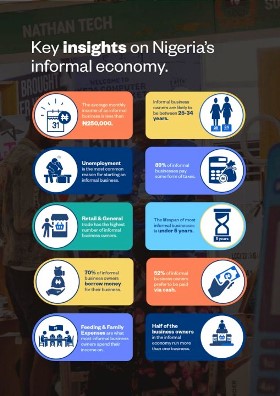By Chidorum Nwakanma
- Processes 72 million cards monthly.
- Will formalise 30m SMEs in five years.
Microfinance and fintech firm Moniepoint MFB has identified four areas where it suggests that SMEs should improve to scale their businesses and remain stable in these difficult times. It is willing to lead the charge.
RELATED: We have redefined payments in Nigeria with flexible options – Moniepoint’s Ndugbu
Moniepoint enrolled two million businesses in five years (2019-2024). Tosin Eniolorunda, CEO of Moniepoint MFB, said, “To us, the informal economy represents an opportunity to make the kind of impact that people can feel daily regardless of their income level or social status.”
Eniolorunda added, “By quantifying the informal economy’s impacts and nuances, we can better shape policies and programs to empower and uplift the entrepreneurs driving it forward. Their success is inextricably linked to Nigeria’s continued growth and development.”
What are the key learnings and Moniepoint’s route to success for itself and small-scale businesses?
1. Local presence. Moniepoint grew by being available where its customers do their business. It has provided them access to banking systems, enabling them to enter the national financial system and database. Many SMEs, thus enrolled, can now seek and access credit.
2. Easier access to banking services that allowed SMEs to transition to more formalised systems.
The report observed that “Banking systems provide leverage for many formalised businesses, from payment collection to the ability to perform business transactions at a larger scale. Many of the businesses in the informal economy previously were locked out of these banking systems, so they have been unable to benefit from the advantages that come with being included. Without a bank account, for example, they are limited to transactions with only people they can physically interact with. This lack of access to banking also impacts them in other ways. Many programs and initiatives from development institutions, including the Nigerian government, exist to support businesses of all sizes in the country. However, with most of the businesses in the informal economy invisible, access to them remains constrained. They also need the requisite documentation to apply for these grants. This means that although opportunities exist, they often cannot access them in ways that can help them grow meaningfully.”
3. Formalisation. Building banking and payment services with these businesses in the focus has enabled us to provide them with tools that meet their specific needs. In line with existing regulations, providing banking services for these businesses can see many transitions to a more formalised system. This means increased access to systemic benefits typically available to their more formalised counterparts.
4. Access to credit. Through insights into the financial history of SMES, Moneipoint says it developed a credit assessment system built for them. It can thus provide credit that matches their needs and gives them a better chance at success.
5. Collaboration with relevant government and private agencies.
Moniepoint states: “By partnering with government agencies, we’ve made it easier for businesses to obtain the necessary documentation to become formal. Our ongoing partnership with the Corporate Affairs Commission (CAC) allows business owners to register their business names with the CAC directly on our platform. We’ve also collaborated with the Federal Inland Revenue Service (FIRS) to enable these businesses to quickly obtain their Tax Identification Number. Collaborations like this will formalise about 30 million businesses in the next five years.”
The counsel comes through Moniepoint’s The Informal Economy Report 2024. Highlights of the report include the following:
- N9b (Nine Billion Naira) is available to SMEs as single-digit interest loans.
- SMEs contribute about 37 per cent of GDP in emerging markets.
- Experts use various terms for the economy of SMEs, including “underground,” cash-in-hand, and shadow economy.

“By transaction value in Naira, Retail and general Trade, alongside Food and drinks, accounted for over half of Nigeria’s informal economy at 53.6%”. The constituents are neighbourhood shops, restaurants, supermarkets, and those that sell daily necessities.
The Moniepoint report adds thought leadership and research to its arsenal for growth.
Chidorum Nwakanma is experienced business leader, author, and specialist in integrated marketing communication





























